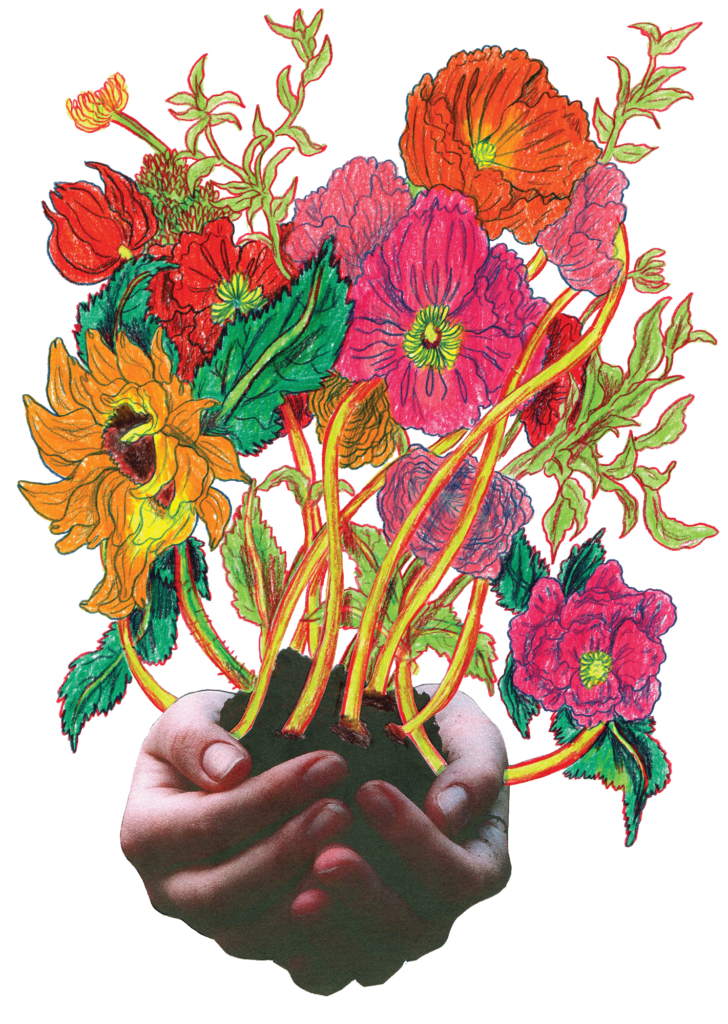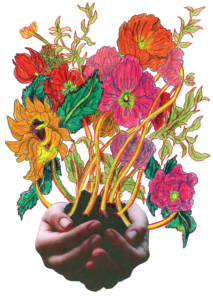“The only thing that makes me happy is being with plants,” Sarah says. “I feel transformed having been here. It’s helped my confidence, my ability to communicate with people and express myself.” Before getting involved with her local community garden project, “Thrive,” Sarah was agoraphobic and unable to leave the house. Today, she travels on public transport to join group gardening activities such as growing vegetables, plant identification, and pruning.
In the UK, tending to community gardens—also known as allotments—is part of the cultural heritage. This traditional grid of plots, each surrounded by a short fence that neighbours can chat over, allows people to come together. From surreptitious glances to see whose broad bean plants are towering the tallest, to exchanging growing tips at the water filling station, tending to an allotment can be a social experience as well as a physical practice.
Growing plants can also be a radical act. From the 1649 Diggers Movement, which fought for the land rights of the lower classes, to immigrants today, who grow ingredients that they enjoyed in their country of origin, allotments can be used to claim a personal stake in the land.
In Newcastle, The Comfrey Project uses allotments and horticulture to welcome refugees and asylum seekers to the region. The initiative revolves around growing vegetables, along with group activities such as willow weaving and beekeeping.
As well as providing a space for creativity and community, nature-based activities have been found to improve people’s mental health and wellbeing.

Finding a sense of community through tending to a shared allotment can have a big impact. Aguirre*, an asylum seeker from El Salvador who arrived in the UK in 2020, explained that The Comfrey Project made the challenging asylum process less difficult. “For me, the meaning of The Comfrey Project is based on three words: integration, generosity and companionship. They have always been willing to help us and I have received their support with appreciation.”
Mandy Jetter founded The Comfrey Project in 2001. “When you’re working in gardens, there is a sense of purpose, a sense of continuity, and there’s a certain sense of predictability,” she says about her motivation behind the project. “Working with nature is something we know is good for all of us and refugees and asylum seekers are no exception.”
Thrive—located in London, Reading and Birmingham—specialises in social and therapeutic horticulture. The project aims to improve the wellbeing of those living with ill health or disabilities and people who are isolated or vulnerable—like Sarah. Communications manager Mark Lang works at Thrive and understands why gardening can boost our mood or reduce anxiety. “It’s an inherently hopeful exercise,” he says. “When you plant a seed, you do so with the expectation that it will result in something meaningful and worthwhile.”
This sentiment is reflected by Carly, who has a learning difficulty. “I used to be angry about things,” she says, “but I feel less angry now and always feel safe coming to Thrive.”
Whether gardening grants hope, routine, a sense of belonging or all three, the potential therapeutic benefits are undeniable. With the possibility to sow seeds, comes the possibility to grow, as an individual and as a community.
*Name changed upon request



